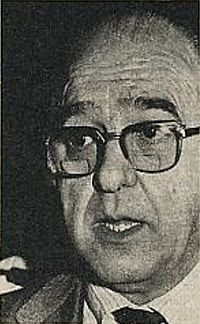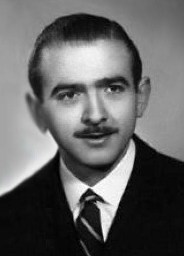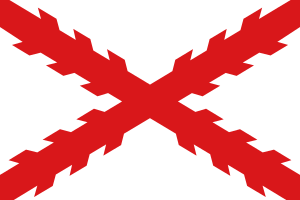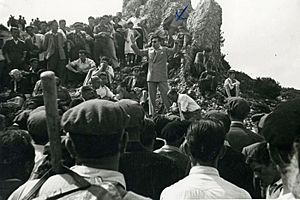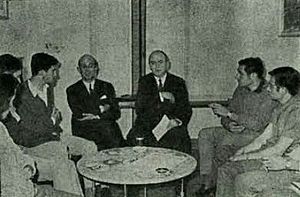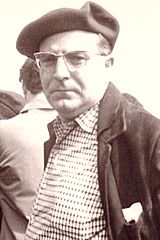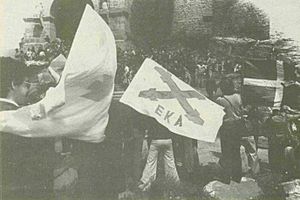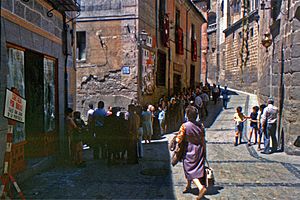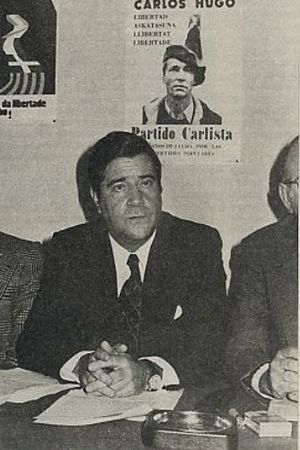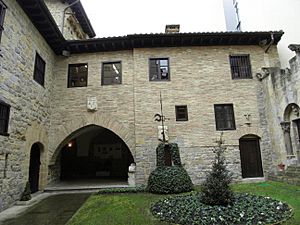Mariano Zufía Urrizalqui facts for kids
Quick facts for kids
Mariano Zufía Urrizalqui
|
|
|---|---|
|
|
|
| Born |
Mariano Zufía Urrizalqui
1920 Pamplona, Spain
|
| Died | 2005 Pamplona, Spain
|
| Nationality | Spanish |
| Occupation | bank official |
| Known for | politician, official |
| Political party | Comunión Tradicionlista, Partido Carlista |
Mariano Zufía Urrizalqui (1920-2005) was a Spanish politician and a public official from Navarre. From 1966 to 1973, he served on the Pamplona city council. During this time, he was a deputy mayor more than once.
Later, from 1974 to 1979, he was part of the Navarrese advisory group called Consejo Foral. Then, from 1979 to 1983, he held a seat in the regional parliament, Parlamento Foral. From 1982 to 1992, he was the president of Cámara de Comptos. This Navarrese institution was in charge of collecting taxes and managing public money.
Mariano Zufía ran for the national parliament (Cortes) in 1971, 1977, and 1979, but he was not elected. He supported the Carlist political movement. In the 1960s, he was part of the main Carlist group. After that, he joined a more modern Carlist group led by Carlos Hugo. From 1977 to 1979, he led the Carlist Party in the Basque Country and Navarre. From 1979 to 1983, he was the national leader of the Partido Carlista.
Contents
Early Life and Family
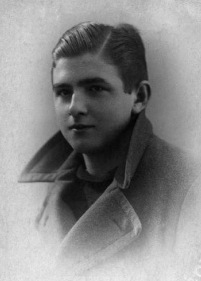
Mariano Zufía's family came from the town of Larraga in Navarre. His grandfather moved to Pamplona in the late 1800s. Mariano's father, Lázaro Zufía Saenz (1892-1958), was born in Pamplona. He worked on the railway and became a station manager. Lázaro married Matilde Urrizalqui Campos, and they had four children. Two of their children died when they were very young.
Mariano went to school in Pamplona and Andoain. In the early 1930s, he studied at a college to prepare for becoming a priest. After two years, he decided not to become a priest. He then went to Instituto of Pamplona. The Spanish Civil War started when he was still in school.
He volunteered to join the Requetés, a Carlist military group. After two months fighting, he got sick and went to a hospital. When he got better, he finished his studies. In 1938, he tried to join aviation school but was not accepted because of his eyesight. He then joined the army. After serving for a few months, he left the army in 1939. He then took business courses. In 1942, he started working at a junior position at Banco de Bilbao in Pamplona.
In 1947, Mariano Zufía married Rosalia Sanz Gurbindo (who passed away in 2011). They lived in Pamplona until 1948. Then, because of Mariano's bank job, they moved to Tudela and Estella. In Tudela, he became the director of the local Banco de Bilbao office. In 1959, they moved back to Pamplona. Mariano became the deputy-manager of the bank's branch there.
Mariano and Rosalia had seven children: Mariano, José Javier, Carlos, Mertxe, Rosa, Pablo, and Enrique. None of them became famous public figures. However, Rosa Zufía Sanz is known in Gipuzkoa as a journalist for the Basque TV station ETB. Carlos Zufía Sanz is also known for his work with a media research group in Navarre.
Early Political Activities (Before 1960)
Both of Mariano Zufía's parents came from Carlist families and supported the movement. His father wrote for Carlist newspapers. Mariano became involved in the Carlist movement when he was a teenager. He joined youth groups and took part in school protests in the 1930s. These protests were against what they saw as anti-religious education policies. Mariano believed his Catholic faith was the main reason for his political choices. He joined the Requetés and trained with them. He served in combat units twice during the Civil War.
Zufía did not agree with the forced joining of different political groups into FET y de las JONS by Francisco Franco. He felt that Franco had used the Carlists unfairly. After his military service, he took part in anti-Franco protests in Pamplona in 1944. He was arrested for shouting "subversive" slogans. He was forced to live in Zaragoza for six months. When he returned, he continued his opposition activities. In December 1945, a large Carlist rally ended in fighting between Carlists and police. Zufía was arrested again and spent two weeks in jail.
After getting married in 1947, Zufía focused on his family and bank career. He lived in smaller Navarrese cities for a while. During this time, his Carlist activities were mainly private. He attended the yearly Montejurra ascents, which were important Carlist gatherings. He also joined Catholic organizations. These groups helped him develop his ideas about a fairer society.
Becoming a Public Official (1960-1971)
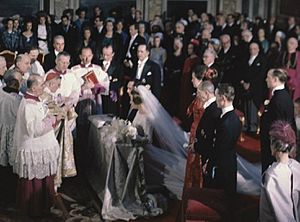
In 1960, Zufía tried to become a public official for the first time. He led a group of Carlist candidates who ran for the Pamplona city council. He won, but his election was canceled because he had not lived in the district for two years. His supporters said this was just a trick to stop opposition candidates. In 1963, Zufía did not run, but he helped organize the Carlist campaign in Navarre. Three Carlist candidates were elected that year. He was happy to see the Carlist movement becoming stronger, especially with the help of Prince Carlos Hugo. In 1964, Zufía and his wife went to Rome for the prince's wedding.
In the local elections of 1966, Zufía ran as a candidate for a Catholic workers' group. He and two other candidates were elected. Zufía became a deputy mayor and the head of the finance committee. He worked on many projects that helped the community. He was known for being part of a "social group." Some of his actions, which were against the government, caused problems. For example, a conference on human rights he organized in 1968 was stopped by the authorities.
The same year, Zufía refused to sign a statement that condemned a bombing attempt by ETA. He said he could not sign a document that supported the government. Because of this, he was removed from his position as deputy mayor. This led to some small public protests. In 1969, he was fined for problems related to organizing the large Montejurra rally. In the early 1970s, he was made deputy mayor again.
By the late 1960s, the group led by Carlos Hugo took control of the Carlist movement. Zufía supported this group's shift towards more progressive ideas. He was involved in religious groups and helped with the finances of the local church. His social work in the city council, like supporting a large development project in Pamplona, also fit with Carlos Hugo's progressive goals. Zufía supported removing some older Carlist leaders from the party. He later said he fully supported the new left-wing direction of the Carlists.
Leading the Carlist Party (1971-1976)
By the late 1960s, Zufía was a well-known figure in Navarre. He was a deputy director at the Banco de Bilbao and a city council member. He started attending meetings of Carlos Hugo's group. His political activity became very busy. He took part in meetings, gave talks, and attended political gatherings. When the Carlist groups became the Partido Carlista around 1970 or 1971, he joined its main leadership council. He also worked on studies about social and economic issues.
In 1971, two Carlist members of the national parliament refused to sign a blank resignation letter that Carlos Hugo wanted. Zufía tried to convince them to sign, but they refused. Zufía then ran for parliament himself, focusing his campaign on peace, social justice, Navarre, and family. However, he did not win.
In 1971, Zufía was appointed to the new top leadership body of the Partido Carlista. He often co-signed important party documents. He also represented the party in strike committees in Navarre. As a bank professional, he helped manage the party's money. In 1973, he refused to sign a city council statement condemning an ETA attack. An investigation was started against him, but he was not punished.
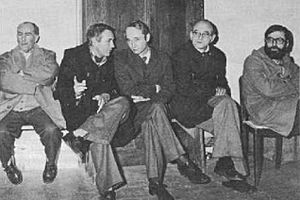
In 1973, Zufía decided not to seek another term on the city council. His term ended in 1974. However, that same year, he ran for the Consejo Foral, an advisory body in Navarre. He was easily elected. In the last years of Franco's rule, Zufía and his sons were very active in political activities. For example, he hosted the editors of a political newsletter at his house. The government saw him as a dangerous rebel. He was not promoted to director of the Banco de Bilbao branch in Pamplona, even though it had been planned. In the early 1970s, he took unpaid leave from the bank to help reorganize the finances of the Pamplona church. In 1975, he decided to retire early from the bank.
In Party Leadership (1976-1979)
In late 1975, Carlos Hugo asked Zufía to move to Madrid to help manage the daily politics of the Partido Carlista. Zufía agreed. In early 1976, he represented the party in a group called Plataforma de Convergencía Democrática. This group later joined with another to form Platajunta, and Zufía continued his role. He was very active, and the police sometimes intervened. His sons were arrested several times. He also represented the left-wing opposition at meetings abroad.
Like most Carlist leaders, he supported a "rupturista" strategy. This meant he wanted a quick, revolutionary change to the political system, not a slow shift to democracy. In late 1976, he said that Spain was living under a "dictatorial regime."
After more than a year in Madrid, Zufía returned to Pamplona in 1977. He became the head of the Carlist Party's branch in the Basque Country and Navarre. He worked hard to get the party officially registered so it could take part in the upcoming elections. In April, he and about 100 Carlist members took over the Consejo Foral building. They displayed Basque and Carlist flags and demanded the party be made legal. Some members of the Consejo wanted him removed, but it did not happen.
In May 1977, Zufía gave a speech at a large party gathering in Javier. He also talked with ETA to ensure a peaceful election campaign. The Carlist Party was not officially registered before the 1977 elections. So, they campaigned as "Agrupación Electoral Montejurra." Zufía led the Carlist candidates in Navarre, but they did not win enough votes.
In late 1977, he helped Carlos Hugo return to Spain. He was also a key figure at the party congress when the Carlist Party finally became legal. As a member of the Consejo Foral in 1978, he worked on laws for Navarre's self-government. He also helped draft the Basque self-rule law. Zufía believed Navarre belonged to the Basque Country and wanted a common Basque-Navarrese region. However, he later changed his mind due to limited support in Navarre.
In the national elections of early 1979, Zufía ran for the senate in Navarre but lost. However, a month later, he ran for the new Navarrese parliament, Parlamento Foral. He won enough votes in the Estella district to be elected. His term on the Consejo Foral ended in 1979 when that body stopped existing.
Party Leader (1979-1983)
After the bad election results of 1979, many top Carlist leaders, including Carlos Hugo, resigned. Carlos Hugo seemed to be thinking about dissolving the party. This idea was hard for older members like Zufía to understand. Soon after, Carlos Hugo left the party and stopped being involved in Spanish politics.
However, the Partido Carlista congress in November 1979 was full of people who wanted to continue. Mariano Zufía was elected as the new secretary general. He was the only candidate and was voted in by everyone. Since the position of party president was removed, Zufía became the effective leader of the Partido Carlista. He said that Carlos Hugo left the party for personal reasons.
Most of what we know about Zufía's public work in the early 1980s comes from his time in the Navarrese parliament. He continued to focus on social issues. He supported creating a regional economic council and a secular university in Navarre. He also challenged right-wing politicians. A big argument started when he supported a motion to remove a Franco-era symbol from the Navarrese flag. Some traditional Carlist groups called him a traitor.
In 1981, the regional parliament elected him as the first president of Cámara de Comptos. This historical Navarrese body was re-established to handle local tax collection and public spending. He started this job in early 1982.
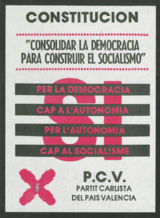
As leader of the Partido Carlista, Zufía tried to fight against the feeling of defeat within the party. However, he could not stop the party from losing its support among voters. In the 1982 national elections, Zufía was supposed to lead the Carlist list for the Senate, but the party decided not to take part in the elections.
In the local Navarrese elections of 1983, the party got fewer votes than in 1979. Zufía led the Carlist list but did not win. So, his term as a member of the Parlamento Foral ended. The Partido Carlista lost its only representative in Navarre's self-governing bodies. He accepted the defeat and resigned as secretary general in 1983.
In 1984, new rules said that the president of Cámara de Comptos could not be a member of any political party. Zufía chose to continue his administrative career. In 1985, he resigned his membership in the Partido Carlista. The same year, he was re-elected as president of the Cámara.
Later Years (After 1985)
In the late 1980s, Zufía served his second term as president of Cámara de Comptos. He is remembered as a fair public servant who fought against corruption. He pushed for transparency in public spending. His term ended in 1991. He could have been re-elected, but Zufía decided not to run again. He felt that 10 years in office was enough. He wanted to set an example for good public administration by resigning. He stopped being president in 1992.
After retiring, he became involved in charity work. He focused on an organization that helped people who were unable to care for themselves. In 1993, he was elected its president.
Zufía still considered himself a Carlist. In the mid-1980s, he said the party "could not simply disappear." He felt that all their efforts should not be given up. In the 1990s, he changed his mind about the party. He said that Carlism had a strong emotional side but was no longer a good political platform. He believed that Carlism for him was a general guide, focused on socialism, self-management, and local power. He was proud of his past in the Carlist movement. He felt that even though the "rupturista" strategy failed in the 1970s, at least the progressive Carlists had saved Carlism from extreme traditionalists. He did not consider those who followed very traditional Carlist ideas to be true Carlists.
Mariano Zufía passed away due to a lung illness. At the time, he had six grandchildren.
Today, Mariano Zufía is mostly remembered as a public official from Navarre. He helped build the region's system for taxes and public spending. In 2007, a group that promotes transparency in public finances created the Premio Mariano Zufía award. It has been given out since 2009. On some Carlist Party websites, he is listed as a former party leader and an important person. He is still the only Carlist Party representative ever elected to a regional or national parliament. In history books about Carlism or Spain's transition to democracy, he is mentioned as someone who led the Partido Carlista as it became a smaller political force.
See also
 In Spanish: Mariano Zufía para niños
In Spanish: Mariano Zufía para niños
- Carlist Party
- Carlist Party of Euskal Herria
- Socialismo autogestionario


